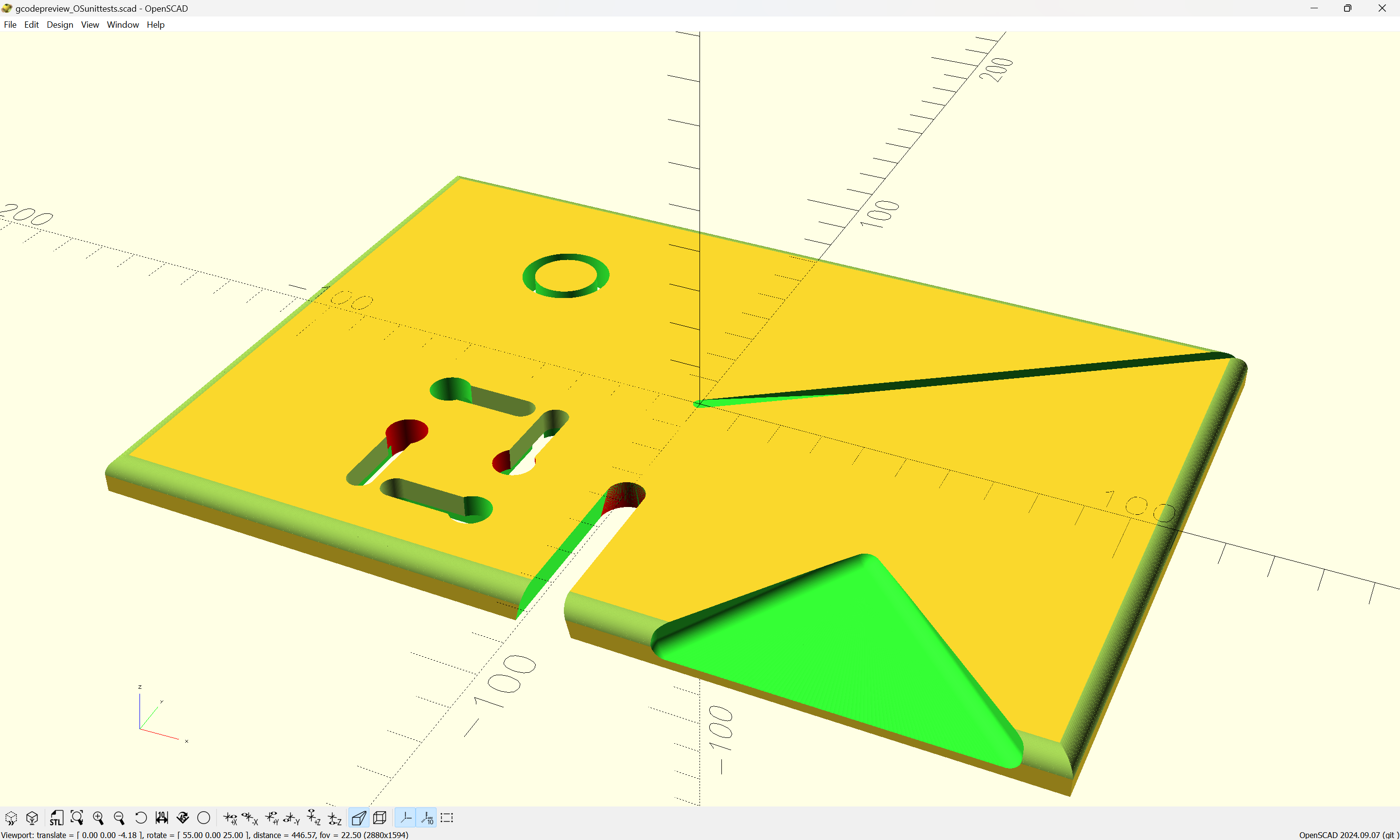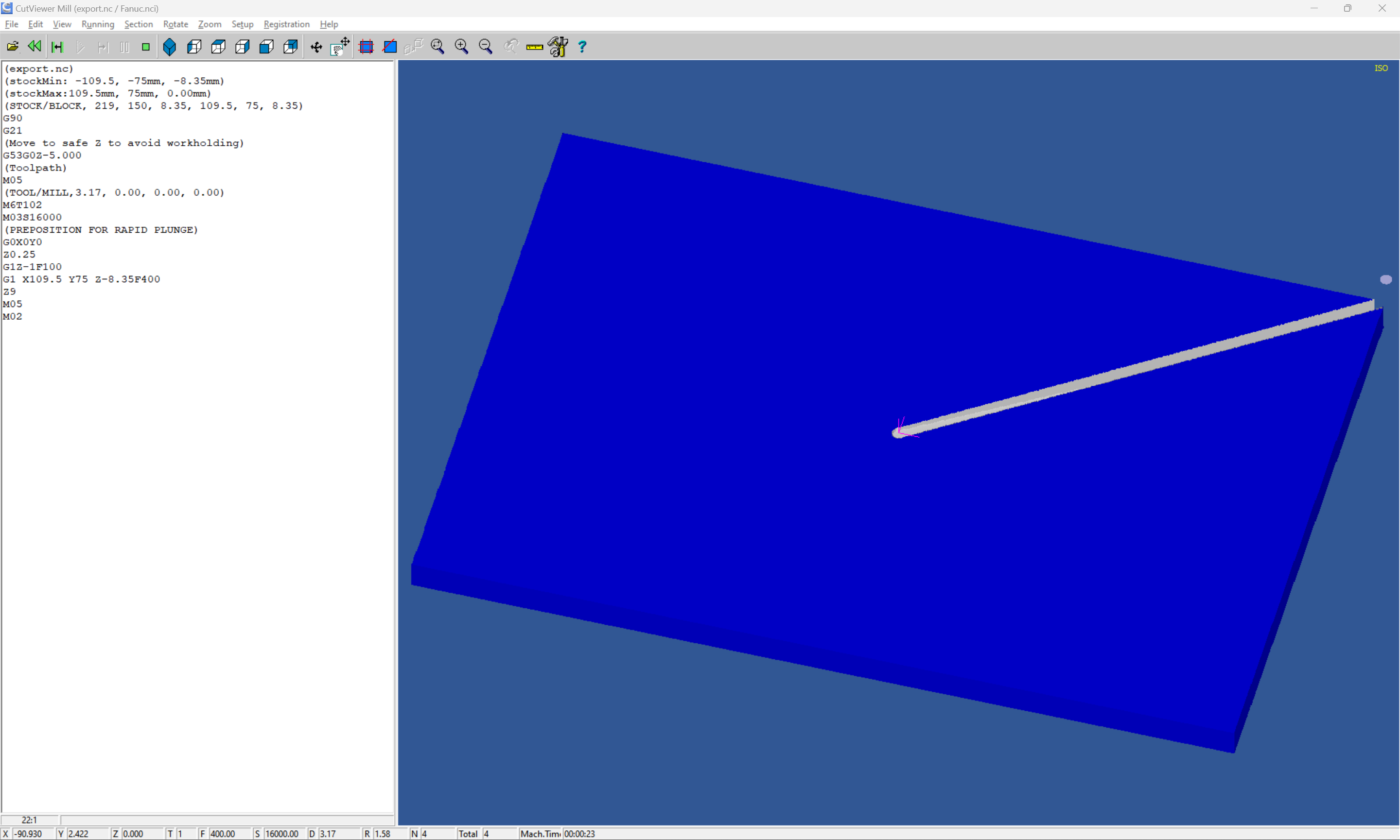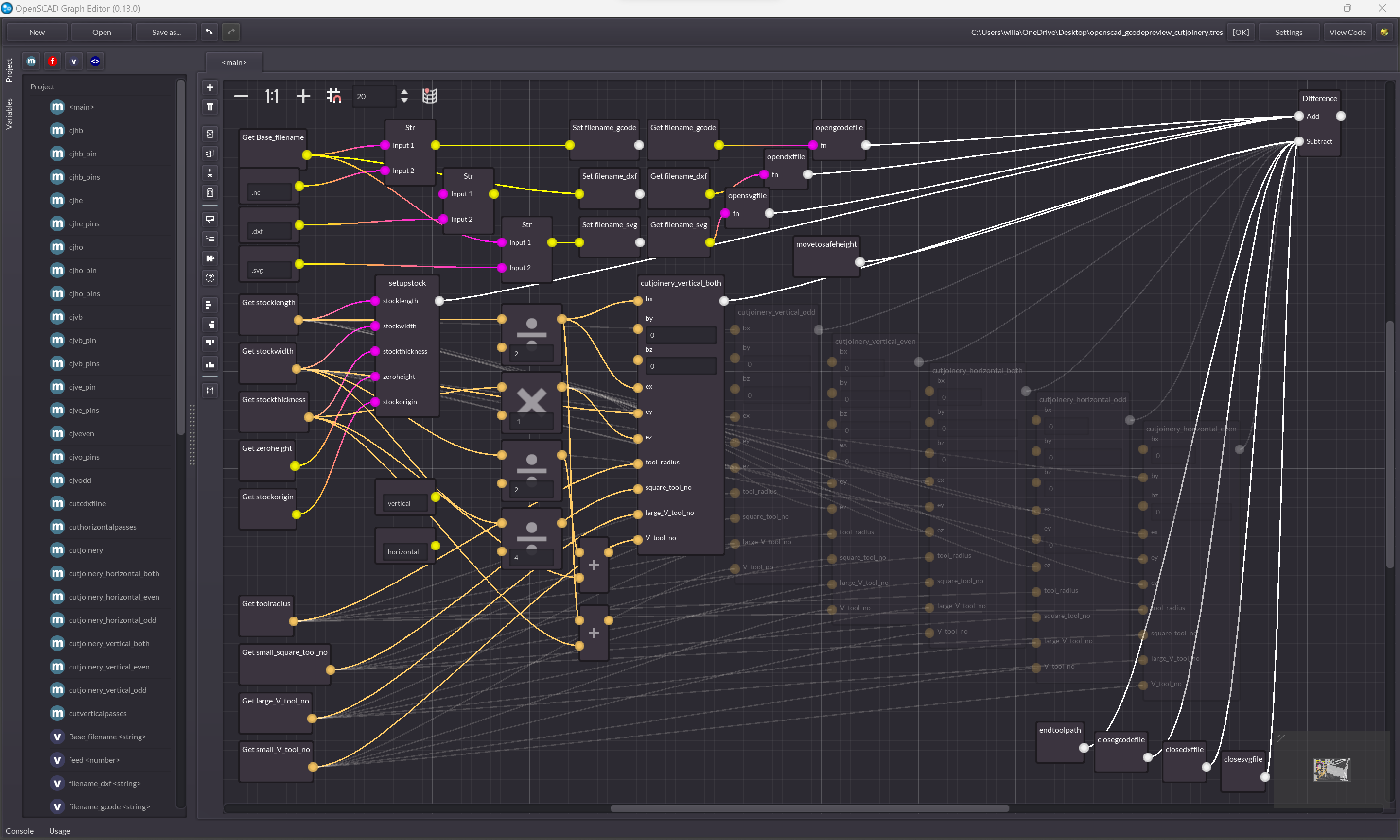OpenPythonSCAD library for moving a tool in lines and arcs so as to model how a part would be cut using G-Code, so as to allow OpenPythonSCAD to function as a compleat CAD/CAM solution for subtractive 3-axis CNC (mills and routers) by writing out G-code in addition to 3D modeling (in some cases toolpaths which would not normally be feasible), and to write out DXF files which may be imported into a traditional CAM program to create toolpaths.
Updated to make use of Python in OpenSCAD:1
https://pythonscad.org/ (previously this was http://www.guenther-sohler.net/openscad/ )
A BlockSCAD file for the initial version of the main modules is available at:
https://www.blockscad3d.com/community/projects/1244473
The project is discussed at:
https://forum.makerforums.info/t/g-code-preview-using-openscad-rapcad/85729
and
https://forum.makerforums.info/t/openscad-and-python-looking-to-finally-be-resolved/88171
and
https://willadams.gitbook.io/design-into-3d/programming
Since it is now programmed using Literate Programming (initially a .dtx, now a .tex file) there is a PDF: https://github.com/WillAdams/gcodepreview/blob/main/gcodepreview.pdf which includes all of the source code with formatted commentary.
The files for this library are:
- gcodepreview.py (gcpy) --- the Python functions and variables
- pygcodepreview.scad (pyscad) --- the Python functions wrapped in OpenSCAD (deprecated)
- gcodepreview.scad (gcpscad) --- OpenSCAD modules and variables
- gcodepreview_template.scad (gcptmpl) --- .scad example file
- gcodepreviewtemplate.py (gcptmplpy) --- .py example file
If using from OpenPythonSCAD, place the files in C:\Users\~\Documents\OpenSCAD\libraries and call as:2
Note that it is necessary to use the first file (this allows loading the Python commands (it used to be necessary to use an intermediary .scad file so as to wrap them in OpenSCAD commands) and then include the last file (which allows using OpenSCAD variables to selectively implement the Python commands via their being wrapped in OpenSCAD modules) and define variables which match the project and then use commands such as:
opengcodefile(Gcode_filename);
opendxffile(DXF_filename);
difference() {
setupstock(stockXwidth, stockYheight, stockZthickness, zeroheight, stockzero);
movetosafez();
toolchange(squaretoolnum,speed * square_ratio);
begintoolpath(0,0,0.25);
beginpolyline(0,0,0.25);
cutoneaxis_setfeed("Z",-1,plunge*square_ratio);
addpolyline(stockXwidth/2,stockYheight/2,-stockZthickness);
cutwithfeed(stockXwidth/2,stockYheight/2,-stockZthickness,feed);
endtoolpath();
endpolyline();
}
closegcodefile();
closedxffile();
which makes a G-code file:
but one which could only be sent to a machine so as to cut only the softest and most yielding of materials since it makes a single full-depth pass, and of which has a matching DXF which may be imported into a CAM tool --- but which it is not directly possible to assign a toolpath in readily available CAM tools (since it varies in depth from beginning-to-end).
Importing this DXF and actually cutting it is discussed at:
https://forum.makerforums.info/t/rewriting-gcodepreview-with-python/88617/14
Alternately, gcodepreview.py may be placed in a Python library location and used directly from Python --- note that it is possible to use it from a "normal" Python when generating only DXFs.
Tool numbers match those of tooling sold by Carbide 3D (ob. discl., I work for them).
Comments are included in the G-code to match those expected by CutViewer.
Supporting OpenSCAD usage makes possible such examples as: openscad_gcodepreview_cutjoinery.tres.scad which is made from an OpenSCAD Graph Editor file:
Version 0.1 supports setting up stock, origin, rapid positioning, making cuts, and writing out matching G-code, and creating a DXF with polylines.
Added features since initial upload:
- endpolyline(); --- this command allows ending one polyline so as to allow multiple lines in a DXF
- separate dxf files are written out for each tool where tool is ball/square/V and small/large (10/31/23)
- re-writing as a Literate Program using the LaTeX package docmfp (begun 4/12/24)
- support for additional tooling shapes such as dovetail and keyhole tools
Version 0.2 adds support for arcs
- DXF: support for arcs (which may be used to make circles) (6/1/24)
- Specialty toolpaths such as Keyhole which may be used for dovetail as well as keyhole cutters
Version 0.3
- Support for curves along the 3rd dimension
- support for roundover tooling
Version 0.4
- Rewrite using literati documentclass, suppression of SVG code
- dxfrectangle (without G-code support)
Version 0.5
- more shapes
- consolidate rectangles, arcs, and circles in gcodepreview.scad
Version 0.6
- notes on modules
- change file for setupstock
Version 0.61
- validate all code so that it runs without errors from sample file
- NEW: Note that this version is archived as gcodepreview-openscad_0_6.tex and the matching PDF is available as well
Version 0.7
- re-write completely in Python --- note that it is possible to use from within OpenPythonSCAD and an OpenSCAD wrapper is not functional at this time --- note that the OpenSCAD wrapper will need to be rewritten
Possible future improvements:
- support for additional tooling shapes (bowl bits with flat bottom, tapered ball nose, lollipop cutters)
- create a single line font for use where text is wanted
Note for G-code generation that it is up to the user to implement Depth per Pass so as to not take a single full-depth pass. Working from a DXF of course allows one to off-load such considerations to a specialized CAM tool.
Deprecated feature:
- exporting SVGs --- while this was begun, it turns out that these would be written out upside down due to coordinate system differences between OpenSCAD/DXFs and SVGs requiring managing the inversion of the coordinate system (it is possible that METAPOST, which shares the same orientation and which can write out SVGs will be used instead for future versions)
Footnotes
-
Previous versions had used RapCAD, so as to take advantage of the writeln command, which has since been re-written in Python. ↩
-
C:\Users\~\Documents\RapCAD\libraries is deprecated since RapCAD is no longer needed since Python is now used for writing out files)
use <gcodepreview.py>; use <pygcodepreview.scad>; include <gcodepreview.scad>; ↩


